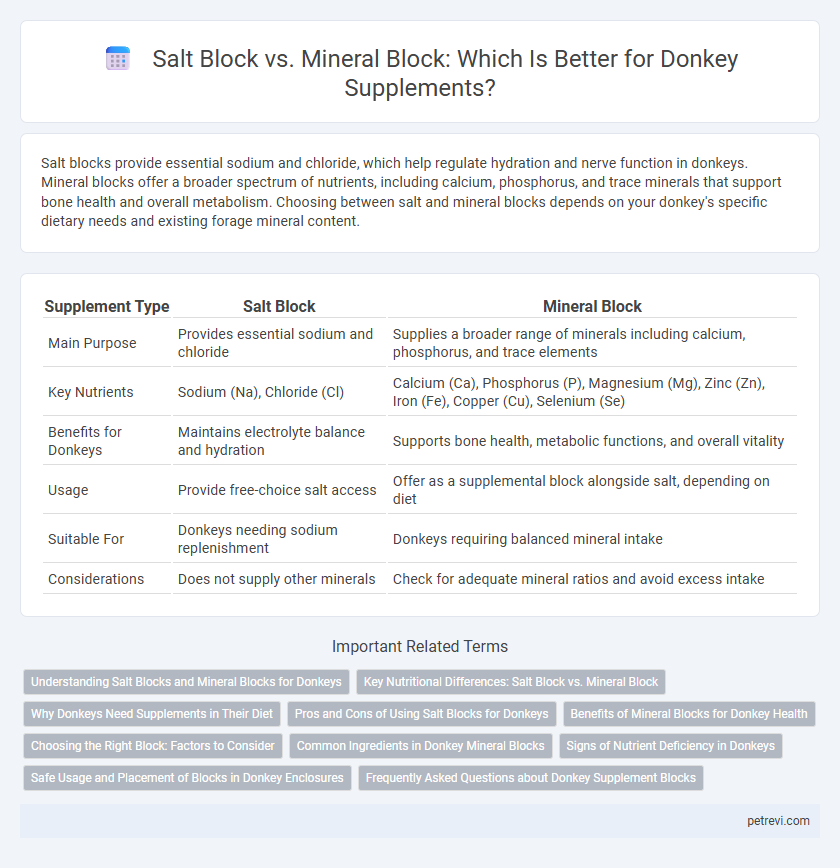Salt blocks provide essential sodium and chloride, which help regulate hydration and nerve function in donkeys. Mineral blocks offer a broader spectrum of nutrients, including calcium, phosphorus, and trace minerals that support bone health and overall metabolism. Choosing between salt and mineral blocks depends on your donkey's specific dietary needs and existing forage mineral content.
Table of Comparison
| Supplement Type | Salt Block | Mineral Block |
|---|---|---|
| Main Purpose | Provides essential sodium and chloride | Supplies a broader range of minerals including calcium, phosphorus, and trace elements |
| Key Nutrients | Sodium (Na), Chloride (Cl) | Calcium (Ca), Phosphorus (P), Magnesium (Mg), Zinc (Zn), Iron (Fe), Copper (Cu), Selenium (Se) |
| Benefits for Donkeys | Maintains electrolyte balance and hydration | Supports bone health, metabolic functions, and overall vitality |
| Usage | Provide free-choice salt access | Offer as a supplemental block alongside salt, depending on diet |
| Suitable For | Donkeys needing sodium replenishment | Donkeys requiring balanced mineral intake |
| Considerations | Does not supply other minerals | Check for adequate mineral ratios and avoid excess intake |
Understanding Salt Blocks and Mineral Blocks for Donkeys
Salt blocks for donkeys primarily provide essential sodium and chloride, crucial for maintaining electrolyte balance and preventing dehydration. Mineral blocks offer a broader range of nutrients, including calcium, phosphorus, magnesium, and trace minerals, supporting overall health, hoof strength, and coat condition. Choosing between salt and mineral blocks depends on the donkey's diet and specific nutritional needs to ensure optimal supplementation.
Key Nutritional Differences: Salt Block vs. Mineral Block
Salt blocks primarily provide sodium and chloride, essential for maintaining electrolyte balance in donkeys, while mineral blocks offer a broader spectrum of trace minerals such as zinc, copper, and selenium critical for immune function and metabolic processes. Donkeys require these minerals in specific amounts to prevent deficiencies that can lead to poor coat condition and weakened health. Selecting the appropriate block depends on the animal's dietary needs and forage mineral content to ensure optimal supplementation.
Why Donkeys Need Supplements in Their Diet
Donkeys require supplements like salt blocks or mineral blocks to maintain electrolyte balance and support vital bodily functions such as nerve transmission and muscle control. Their natural diet is often low in essential minerals like sodium, calcium, and phosphorus, making supplementation crucial to prevent deficiencies and promote overall health. Proper supplementation helps improve hydration, digestion, and immune system performance, ensuring donkeys thrive in diverse environments.
Pros and Cons of Using Salt Blocks for Donkeys
Salt blocks for donkeys provide essential sodium and chloride, supporting electrolyte balance and hydration, but they often lack additional trace minerals needed for optimal health. Their simplicity and affordability make them convenient, yet relying solely on salt blocks may lead to mineral deficiencies if donkeys' diets do not include other mineral sources. Salt blocks dissolve slowly, sometimes leading to inconsistent intake, which can affect donkeys' overall supplement effectiveness.
Benefits of Mineral Blocks for Donkey Health
Mineral blocks provide essential trace minerals like zinc, copper, and selenium that are crucial for donkey immune function, hoof health, and overall vitality. Unlike salt blocks that mainly offer sodium chloride, mineral blocks support balanced nutrition by supplying a wider range of nutrients essential for metabolic processes and bone strength. Consistent access to mineral blocks helps prevent deficiencies that can lead to problems such as poor coat condition, weakened hooves, and compromised reproductive health in donkeys.
Choosing the Right Block: Factors to Consider
Choosing the right supplement block for donkeys depends on their specific nutritional needs, with salt blocks primarily providing essential sodium and chloride, while mineral blocks offer a broader spectrum of minerals such as calcium, phosphorus, and trace elements. Factors to consider include the donkey's diet, workload, health status, and environmental conditions to ensure balanced nutrient intake and prevent deficiencies. Monitoring donkey health and consulting a veterinarian can help determine whether a salt or mineral block is more appropriate for sustained well-being and performance.
Common Ingredients in Donkey Mineral Blocks
Donkey mineral blocks commonly contain essential ingredients such as salt, calcium, phosphorus, magnesium, and trace minerals like zinc, copper, and selenium to support overall health and metabolic functions. These blocks provide balanced supplementation tailored to donkey nutritional needs, contrasting with salt blocks that primarily supply sodium chloride for electrolyte balance. Including minerals like iodine and cobalt in mineral blocks helps prevent deficiencies and promotes optimal digestive and immune system performance in donkeys.
Signs of Nutrient Deficiency in Donkeys
Signs of nutrient deficiency in donkeys include poor coat condition, weight loss, lethargy, and reduced hoof quality, indicating inadequate mineral intake. Salt blocks primarily provide essential sodium and chloride, while mineral blocks offer a broader range of trace elements such as calcium, phosphorus, magnesium, and zinc vital for metabolic functions. Monitoring these symptoms ensures timely supplementation with the appropriate salt or mineral blocks to maintain optimal donkey health and performance.
Safe Usage and Placement of Blocks in Donkey Enclosures
Salt blocks and mineral blocks both provide essential nutrients for donkeys, but safe usage requires proper placement to avoid contamination and overconsumption. Position blocks in dry, shaded areas away from feeding troughs to prevent moisture buildup and mold growth while ensuring easy donkey access. Regular monitoring of block condition and consumption helps maintain adequate supplementation and prevents health issues related to mineral imbalances.
Frequently Asked Questions about Donkey Supplement Blocks
Salt blocks provide essential sodium and chloride minerals critical for a donkey's electrolyte balance, while mineral blocks offer a broader spectrum of trace elements such as zinc, copper, and manganese necessary for overall health. Donkeys require both types to address specific nutritional needs, with salt blocks primarily supporting hydration and mineral blocks enhancing metabolic functions and hoof health. Regularly rotating between salt and mineral blocks helps prevent deficiencies and supports optimal digestion and immune system performance in donkeys.
Salt Block vs Mineral Block for Donkey Supplements Infographic

 petrevi.com
petrevi.com